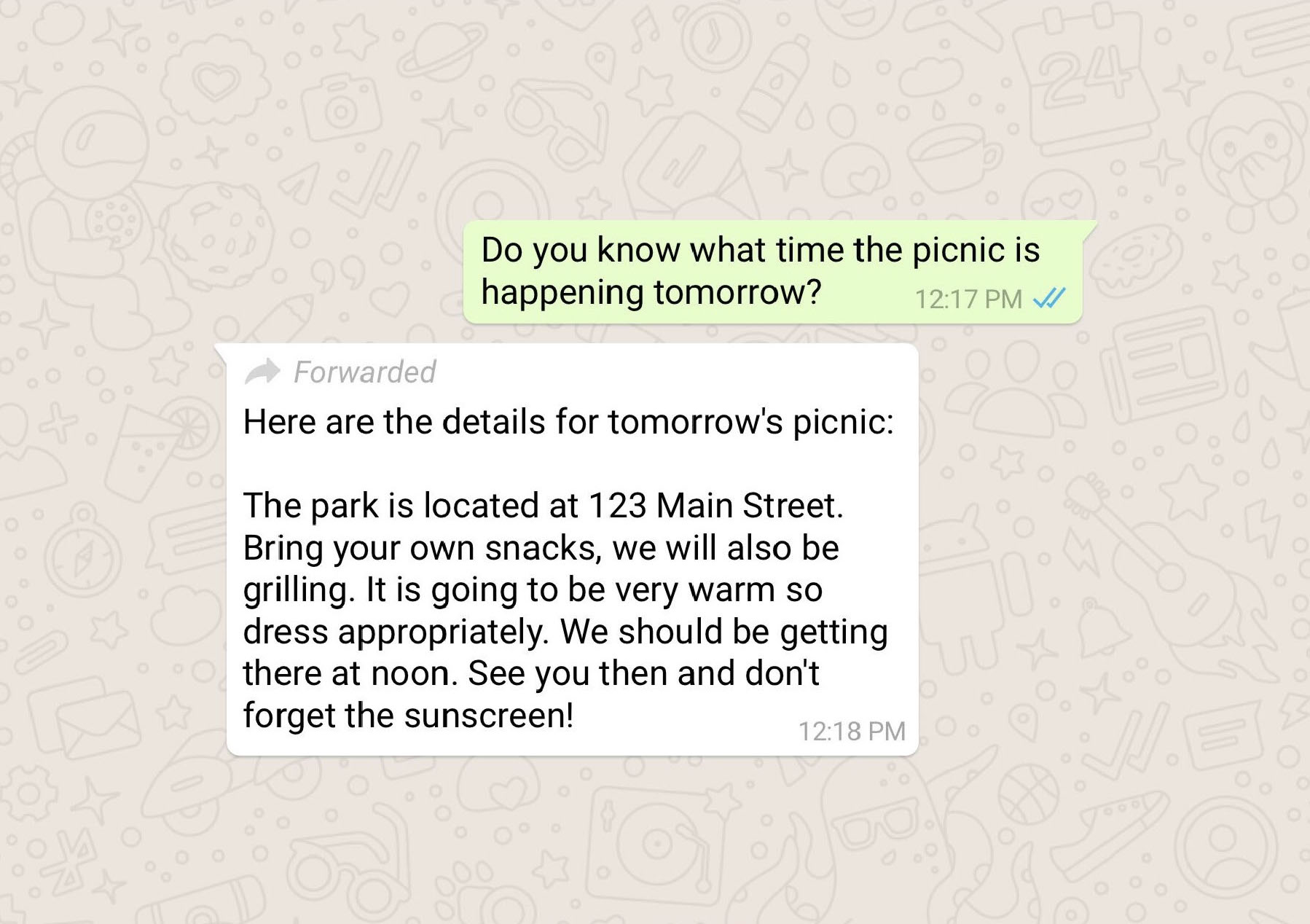Today WhatsApp added a new feature that it hopes will stem the spread of misinformation on the private messaging app.
In a blog post sent to Poynter, WhatsApp announced a new label that will indicate when a message has been forwarded to someone from another user. The label will apply to text, image, video and audio messages globally, a spokesperson confirmed to Poynter.
“This extra context will help make one-on-one and group chats easier to follow,” the post reads. “It also helps you determine if your friend or relative wrote the message they sent or if it originally came from someone else.”
Prior to its launch, WhatsApp had been beta testing the forwarded label in India — the Facebook-owned platform’s largest market, with more than 200 million users. Viral rumors there have been linked to roughly a dozen deaths since May, when the messaging app became a key source of fake news during a contentious local election in Karnataka state.
The product change is significant for WhatsApp, which rarely changes its user interface — and it comes in close succession to a series of other steps the company has taken in recent weeks to address its fake news problem. Those include a $50,000 award program for researchers studying misinformation on the app, greater control for group administrators who want to weed out spam and a commitment to supporting fact-checking organizations that use the platform to debunk hoaxes.

“WhatsApp cares deeply about your safety,” the post reads. “We encourage you to think before sharing messages that were forwarded.”
In addition to clueing users into whether or not a message could be a forwarded hoax, WhatsApp told Poynter that the label will give the company greater insight into “the aggregate amount of forwarded messages sent on WhatsApp.” That could be a big step toward understanding how misinformation functions on the platform, whose encryption makes it impossible for both users, researchers and the company itself to see when and where things go viral.
Also on Tuesday, WhatsApp launched an education campaign in India that’s aimed at helping users spot fake news on the platform. It started with the publication of several full-page advertisements in English, Hindi and regional languages in newspapers across the country — a strategy that borrows from Facebook’s own public relations playbook. WhatsApp told Poynter it plans to build on those efforts in the future.
"Just because a message is shared many times, does not make it true."@WhatsApp goes old-school to fight it's fake news problem in India — its largest market — with full-page newspaper ads. https://t.co/TTn8wphe0Z pic.twitter.com/CJAlrb0wk7
— Rishi Iyengar (@Iyengarish) July 10, 2018
WhatsApp didn’t share any future product changes it has planned, but fact-checkers have expressed their desire for reverse image search capability and a label that indicates who originally sent a message. The company told Poynter the latter feature would violate the company’s commitment to privacy.
Still, some fact-checkers were impressed by WhatsApp’s move to label forwarded messages.
“(I) am reckoning it's the first of many steps and that WhatsApp will keep building on it,” said Govindraj Ethiraj, founder of Indian fact-checking project Boom Live, in a message to Poynter. “There are lots of ingenious applications for platforms like WhatsApp in India — we've mostly seen the positive and now the negative. Let's hope this and other measures will help alleviate the problem of misinformation."
Meanwhile in Brazil, where 120 million of the country’s 200 million citizens use the app, the feature has already been working in some groups of beta users.
“I have seen that on some Samsung phones — not iPhones,” Cristina Tardáguila, director of Agência Lupa, told Poynter. “Those people who have downloaded the beta WhatsApp app are using that already, which is pretty cool. I like it; it’s the first step taken by WhatsApp to fight fake news.”
In the future, she said it would be helpful if WhatsApp added timestamps to the label so that users could see when something was first created. That could cut down on the recurring hoaxes that fact-checkers often see on the platform.
Still, there are some limitations to the feature. Tardáguila said users can simply save media files that are forwarded to them to their phones in order to strip away the label. Then, they send them along to their own groups.
“Brazilians know a lot about how to dodge new things and new rules,” Tardáguila said. “This is something that Brazilians are already doing when they get something that was forwarded by somebody else and they want to deliver it anyway.”







